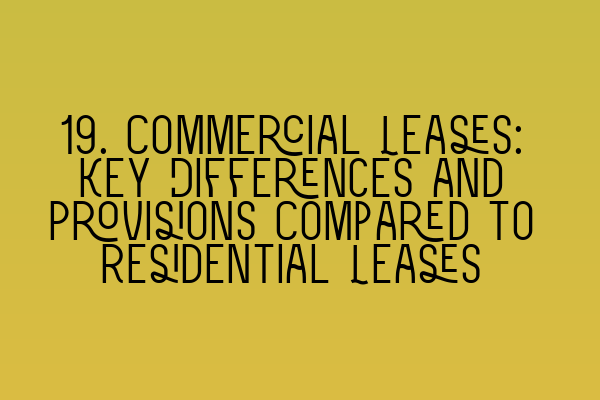19. Commercial Leases: Key Differences and Provisions Compared to Residential Leases
Commercial leases are a fundamental aspect of the property law landscape. They govern the relationship between landlords and tenants in commercial spaces, such as offices, retail stores, and industrial units. Understanding the key differences and provisions in commercial leases compared to residential leases is essential for both landlords and tenants.
In this article, we will explore the distinct characteristics of commercial leases, highlighting important provisions that differ from those found in residential leases. So let’s dive in!
1. Purpose of the Lease
Commercial leases are primarily intended for business purposes, whereas residential leases are designed for individuals to live in a property. The lease will clearly state that the commercial space is to be used for a specific business activity, such as a restaurant, shop, or office. This focus on business use brings several important implications.
2. Length of the Lease
While residential leases often have a fixed term, typically spanning six to twelve months, commercial leases are generally for a longer duration. It is not uncommon for commercial leases to span several years, reflecting the stability and long-term nature of most commercial businesses. The lease agreement will outline the duration of the lease, including any options for renewal or termination.
3. Rent and Rent Reviews
Rent in commercial leases is usually higher than in residential leases due to the business potential of the commercial space. In addition to the base rent, commercial leases often include additional charges, such as service charges, insurance premiums, and property taxes. These additional costs are commonly passed onto the tenant.
Furthermore, commercial leases incorporate rent reviews, which allow the landlord to adjust the rent periodically. Rent reviews can happen every few years or at specific intervals defined within the lease agreement. It is important for both landlords and tenants to understand the rent review provisions and their potential impact on the business.
4. Repair and Maintenance
While residential leases often place the responsibility of repairs and maintenance on the landlord, commercial leases generally require the tenant to maintain and repair the premises. This responsibility extends to both the interior and exterior of the commercial space. The lease agreement will outline the specific repair and maintenance obligations, including who is responsible for structural repairs, routine maintenance, and property improvements.
5. Alterations and Improvements
Commercial leases often allow tenants to make alterations and improvements to the property to suit their business needs. However, these changes typically require written consent from the landlord, and the lease will outline the necessary procedures and conditions for obtaining such consent. It is crucial for tenants to understand the lease’s provisions related to alterations and improvements to avoid breaching the terms of the lease.
6. Assignment and Subletting
Commercial leases often allow tenants to assign or sublet the premises to other businesses. However, this usually requires the landlord’s prior written consent and may be subject to certain conditions specified in the lease. These provisions are important for tenants who may need to transfer or sublet the space to another business during the lease term.
7.Termination and Renewal
Commercial leases typically have more complex termination and renewal provisions compared to residential leases. The lease agreement will specify the notice period required for termination or non-renewal, as well as any penalties or consequences for early termination.
Renewal provisions in commercial leases grant tenants the option to renew the lease at the end of the term, subject to negotiation between the parties. It is crucial for both landlords and tenants to carefully review these provisions and understand their rights and obligations concerning lease termination and renewal.
8. Security of Tenure
In some jurisdictions, commercial leases provide tenants with a level of security of tenure. This means that tenants may have the right to renew the lease or request additional lease terms beyond the original agreement. These rights are subject to specific legislative provisions, and both landlords and tenants should be aware of their rights and obligations concerning security of tenure.
Conclusion
Understanding the key differences and provisions in commercial leases compared to residential leases is vital for anyone involved in the commercial property industry. It is highly recommended for landlords and tenants to seek professional legal advice to ensure compliance with the law and protect their respective interests in commercial lease transactions.
If you want to deepen your knowledge of property law or prepare for the SQE exams, check out our related articles:
– SQE 1 Practice Exam Questions
– SQE 1 Practice Mocks FLK1 FLK2
– SQE 2 Preparation Courses
– SQE 1 Preparation Courses
– SRA SQE Exam Dates
At SQE Property Law & Land Law, our team of expert solicitors can assist you in navigating the complexities of commercial leases and provide guidance tailored to your specific needs. Contact us today to discuss your commercial lease requirements and ensure a smooth and successful leasing experience.
Disclaimer: This article is for informational purposes only and does not constitute legal advice. Always consult a qualified solicitor for advice related to your specific situation.
